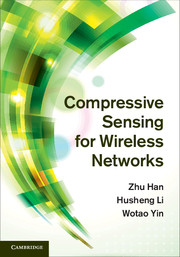10 - Cognitive radio networks
from Part II - CS-Based Wireless Communication
Published online by Cambridge University Press: 05 June 2013
Summary
Introduction
Ever since the 1920s, every wireless system has been required to have an exclusive license from the government in order not to interfere with other users of the radio spectrum. Today, with the emergence of new technologies that enable new wireless services, virtually all usable radio frequencies are already licensed to commercial operators and government entities. According to former U.S. Federal Communications Commission (FCC) chair William Kennard we are facing a “spectrum drought” [356]. On the other hand, not every channel in every band is in use all the time; even for premium frequencies below 3 GHz in dense, revenue-rich urban areas, most bands are quiet most of the time. The FCC in the United States and the Ofcom in the United Kingdom, as well as regulatory bodies in other countries, have found that most of the precious, licensed radio-frequency spectrum resources are inefficiently utilized [37, 357].
In order to increase the efficiency of spectrum utilization, diverse types of technologies have been deployed. Cognitive radio is one of those that leads to the greatest technological gain in wireless capacity. Through the detection and utilization of the spectra that are assigned to the licensed users but standing idle at certain times, cognitive radio acts as a key enabler for spectrum sharing. Spectrum sensing, aiming at detecting spectrum holes (i.e., channels not used by any primary users), is the precondition for the implementation of cognitive radio.
- Type
- Chapter
- Information
- Compressive Sensing for Wireless Networks , pp. 232 - 267Publisher: Cambridge University PressPrint publication year: 2013



